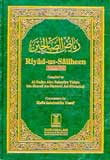Riyad Us-Saliheen (Gardens of the Righteous)

Chapter 277
Prohibition of the Treachery and Breaking one's Covenant
Allah, the Exalted, says:
"O you who believe! Fulfill (your) obligations.'' (5:1)
"And fulfill (every) covenant. Verily! The covenant will be questioned about.'' (17:34)
1584. `Abdullah bin `Amr bin Al-`As (May Allah be pleased with them) said: The Messenger of Allah (PBUH) said, "Whosoever possesses these four characteristics is a sheer hypocrite; and anyone who possesses one of them possesses a characteristic of hypocrisy till he gives it up. These are: when he is entrusted with something, he proves dishonest; when he speaks, he tells a lie; when he makes a covenant, he proves treacherous; and when he quarrels, he behaves in very imprudent, evil, insulting manner.''
[Al-Bukhari and Muslim].
Commentary: This Hadith has already been mentioned (Hadith No. 1544). The traits mentioned in this Hadith are peculiar to hypocrites and every Muslim is required to abstain from them. Excellence of character is riveted with Faith. The nobility of character is invariably reflected in Faith, and where there is no Faith there will be little excellence of character.
1585. Ibn Mas`ud, Ibn `Umar and Anas (May Allah be pleased with them) said: The Prophet (PBUH) said, "For every one who breaks his covenant, there will be a (huge) flag on the Day of Resurrection and it will be said: `This flag proclaims a breach of covenant by so-and-so.'''
[Al-Bukhari and Muslim].
Commentary: "Ghadr'" means breach of oath and its disregard. On the Day of Judgement, a person with such a quality will be given a (huge) flag which will be a sign of his lack of sincerity to his words.
1586. Abu Sa`id Al-Khudri (May Allah be pleased with him) said: The Prophet (PBUH) said, "Every one who breaks a covenant will have a flag by his buttocks on the Day of Resurrection. It will be raised higher according to the nature of his breach. Behold, there will be no greater a sin with respect to breaking the covenant than that of a ruler who breaks his covenant with the Muslim masses.''
[Muslim].
Commentary: This Hadith clearly shows that breach of covenant is forbidden in Islam, especially on the part of a ruler because (a) he is in a position to honour his covenant, and (b) his evil can affect the whole Muslim community.
It was a custom in the Pre-Islamic Period of Ignorance in Arabia to fix flags on poles for those who were guilty of breach of oath to humiliate and defame them. Almighty Allah has mentioned the punishment of flags on the Day of Resurrection for such people who break their covenant so that people can easily understand its nature. What a humiliation that will be!
* Placing the flag by his bottom signifies humiliation and disgrace because flags are usually carried in front of the bearer not behind. (Editor's Note)
1587. Abu Hurairah (May Allah be pleased with him) reported: The Prophet (PBUH) said, "Allah, the Exalted, says: `I will contend on the Day of Resurrection against three (types of) people: One who makes a covenant in My Name and then breaks it; one who sells a free man as a slave and devours his price; and one who hires a workman and having taken full work from him, does not pay him his wages.'''
[Al-Bukhari].
Commentary: This Hadith highlights the importance of fulfillment of promise, the prohibition of the sale of a free person, and the payment of due wages to the labourers.
